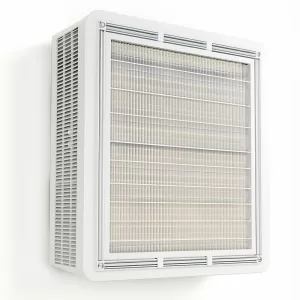
HEPA Filters: Your Solution for Cleaner Air
March 21 2024 
Inquiry
Global electronic component supplier AMPHEO PTY LTD: Rich inventory for one-stop shopping. Inquire easily, and receive fast, customized solutions and quotes.
QUICK RFQ
ADD TO RFQ LIST
In this blog, we will dive into the world of HEPA filters, exploring their functionality, benefits, and practical uses.
What's HEPA Filter?

What do HEPA Filters Remove?
HEPA filters excel at capturing a wide range of airborne contaminants, including:- Microscopic Particles: Particles in the microscopic size range include smoke, dust, and aerosols with a diameter of only 0.3 microns.
- Allergens: Allergens include dust mite detritus, pollen, mold spores, and pet dander.
- Aerosolized Bacteria and Viruses: HEPA filters may capture a sizable portion of the bacteria and viruses in the air, while not being 100% reliable.
Who Invented HEPA Filters?
HEPA filters originated during World War II. To safeguard personnel from dangerous airborne particles during nuclear research, scientists at the United States' Manhattan Project required a solution. The result was the development of highly efficient filters that could collect extremely small radioactive particles. This technique was modified for civilian usage following the war, which resulted in the widespread use of HEPA filters that exist today.Video related to HEPA Filter
Why HEPA Filter is Used?
HEPA filters offer a multitude of benefits, and here are some:- Better Indoor Air Quality: HEPA filters considerably raise the standard of indoor air by removing a variety of airborne pollutants. For those who have allergies or asthma and are sensitive to dust, pollen, and other allergens, this is very beneficial.
- Reduced Allergens: Pet dander, mold spores, and dust mite debris are among the major allergens that HEPA filters efficiently catch, making homes for allergy sufferers more pleasant.
- Enhanced Protection from Respiratory Issues: HEPA filters can help lessen exposure to germs and viruses in the air, which may help minimize the risk of respiratory ailments.
- Improved Building Efficiency: A facility with cleaner air may have more energy-efficient HVAC systems and use less energy overall.
How HEPA Filters Work?
HEPA filters employ a three-pronged approach to air filtration:- Interception: As air passes through the filter, larger particles strike and stick to the filter strands.
- Impaction: Heavy particles impact with and adhere to the fibers of the filter due to inertia when air undergoes abrupt turns inside its pleated structure.
- Diffusion: The tiniest particles move randomly, brushing against and getting trapped by the filter threads.
How HEPA Filters are Made?
HEPA filters are constructed from a fine mesh of fibers, typically made from:- Fiberglass: The most often used material for HEPA filters, fiberglass is both economical and efficient.
- Synthetic Materials: Certain HEPA filters are made of synthetic materials, such as polyester or polypropylene, which operate similarly to fiberglass and may even have hypoallergenic advantages.
Can HEPA Filters be Cleaned and Reused?
Unlike disposable filters, some HEPA filters can be cleaned and reused. However, the reusability depends on the specific model:- Traditional HEPA Filters: These filters should be changed every six months to two years, as directed by the manufacturer. They are normally disposable. Washing them can deteriorate the sensitive fibers and reduce their efficacy.
- Washable HEPA Filters: A few HEPA filters have a washable design. The manufacturer's recommendations should always be followed for the right manner to clean.
How Long do HEPA Filters Last?
The lifespan of a HEPA filter depends on several factors, including:- Filter Quality: Higher-grade HEPA filters tend to live longer than their less-priced counterparts because they are usually constructed of sturdier and more durable materials.
- Usage: HEPA filters need to be changed more frequently and will clog more quickly in high-pollution situations.
- Maintenance: Washable HEPA filters can have their lifespan extended by following the manufacturer's cleaning recommendations regularly.
- Disposable HEPA filters: six months to two years, based on quality and usage
- Washable HEPA filters: 1-2 years (as long as they are properly maintained and cleaned)
When are HEPA Filters Used?
HEPA filters are employed in a wide range of applications where clean air is paramount:- Homes: People with allergies and asthma, as well as those looking to enhance the quality of indoor air, frequently opt for HEPA air purifiers.
- Hospitals and Medical Facilities: To reduce the danger of infection from airborne microorganisms, HEPA filters are utilized in operating rooms, patient rooms, and other healthcare settings.
- Industrial Settings: To shield employees from dangerous dust and particles, HEPA filters are used in factories and workshops.
- Transportation: To improve the quality of the air for passengers, HEPA filters are used in air filtration systems on airplanes and other vehicles.
HEPA Filters Examples
Here are some examples of products that commonly utilize HEPA filters:- Air purifiers: Individual air purifiers made for residential or business use.
- HVAC air filters: HEPA technology is included in certain high-efficiency air filters used in residential air conditioning and heating systems.
- Vacuum cleaners: Compared to conventional vacuums, HEPA vacuums are made to capture dust and allergens more successfully.
- Air masks: To shield users from airborne pollutants, N95 respirator masks use filtering technology akin to HEPA.
Conclusion
At your house, place of business, or any other setting, HEPA filters provide a potent way to achieve cleaner air. You may choose wisely whether to include HEPA filtration in your air purification plan by being aware of its features, advantages and uses. Because HEPA filters are so powerful, you may breathe easier, live a healthier life, and have the peace of mind that comes with knowing that the air around you is cleansed.Related Articles
- ·Stratix 10 VS Stratix V: Which FPGA is Right for Your Next Project?
- ·Intel Xeon Platinum 8454H vs AMD EPYC: Which Reigns Supreme?
- ·A Deep Dive into the AMD EPYC 4564P Processor
- ·MSP430F5438A vs MSP430F5529: A Detailed Analysis of Their Capabilities
- ·Comparing MSP430F6659 and MSP430F5419A: Which One is Right for Your Project?
- ·Exploring the Features of MSP430F5529 and MSP430F5638 Microcontrollers
- ·Demystifying 20 Microcontroller Projects for Beginners
- ·Unveiling the Ultimate Guide to Microcontroller Programming
- ·4680 Battery: Unveiling the Power Potential of the Next-Gen Cell
- ·Exploring the Case Studies on Arduino Applications
Populer Posts
